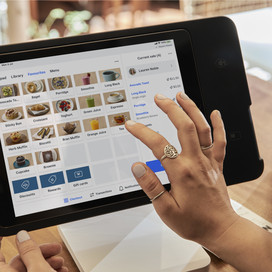Table of contents
Christopher Norris loves all the problem solving when it comes to running a venue. After he purchased Opus Coffee Brewers, he quickly realised bagels were at the heart of the offering. In their tiny kitchen, they still roll and bake their bagels in-house, but now Christopher is looking to expand. He has his eyes set on not one but two more locations, with a bigger kitchen in one which will allow him to prep more bagels for all the venues.
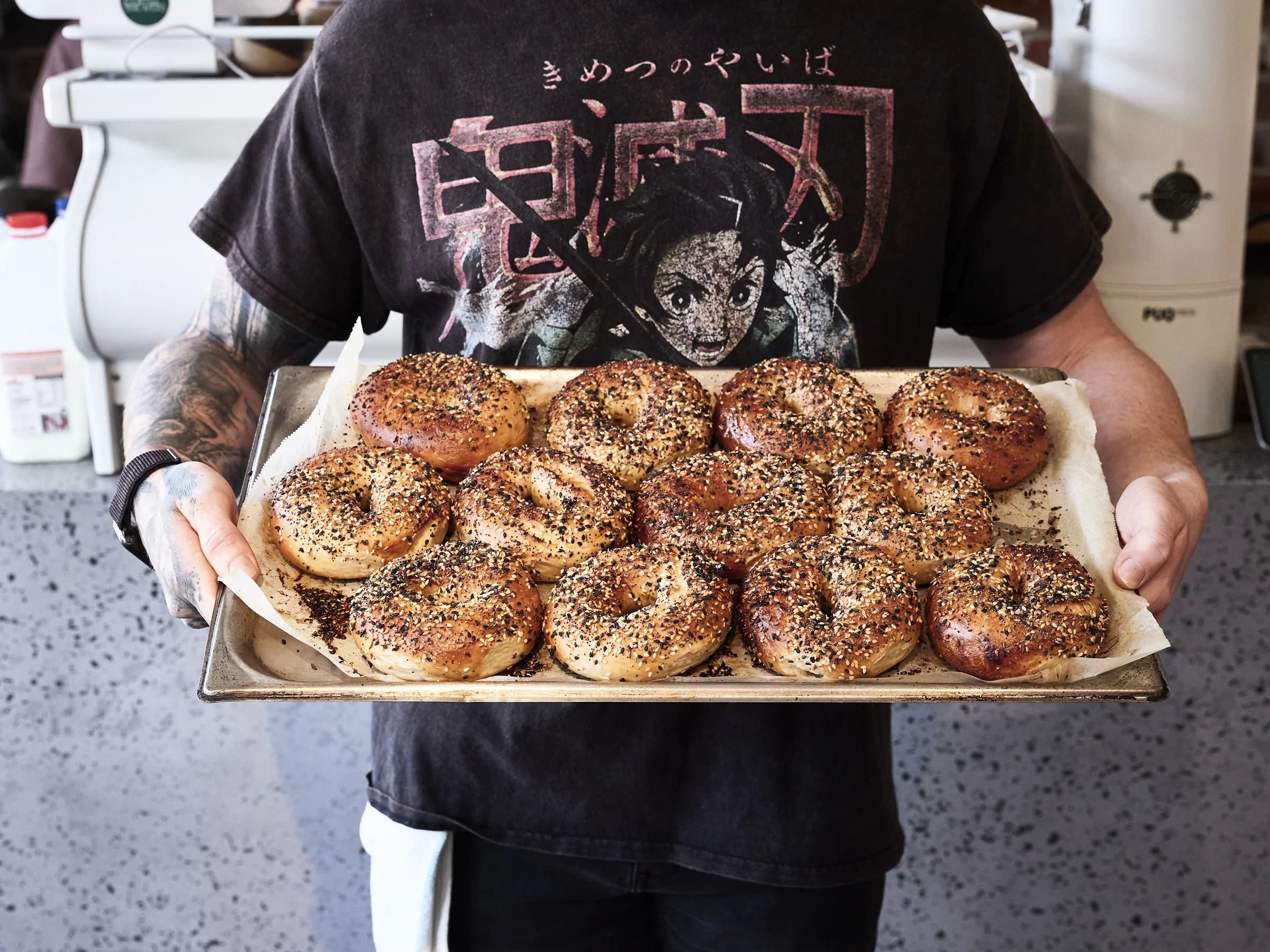
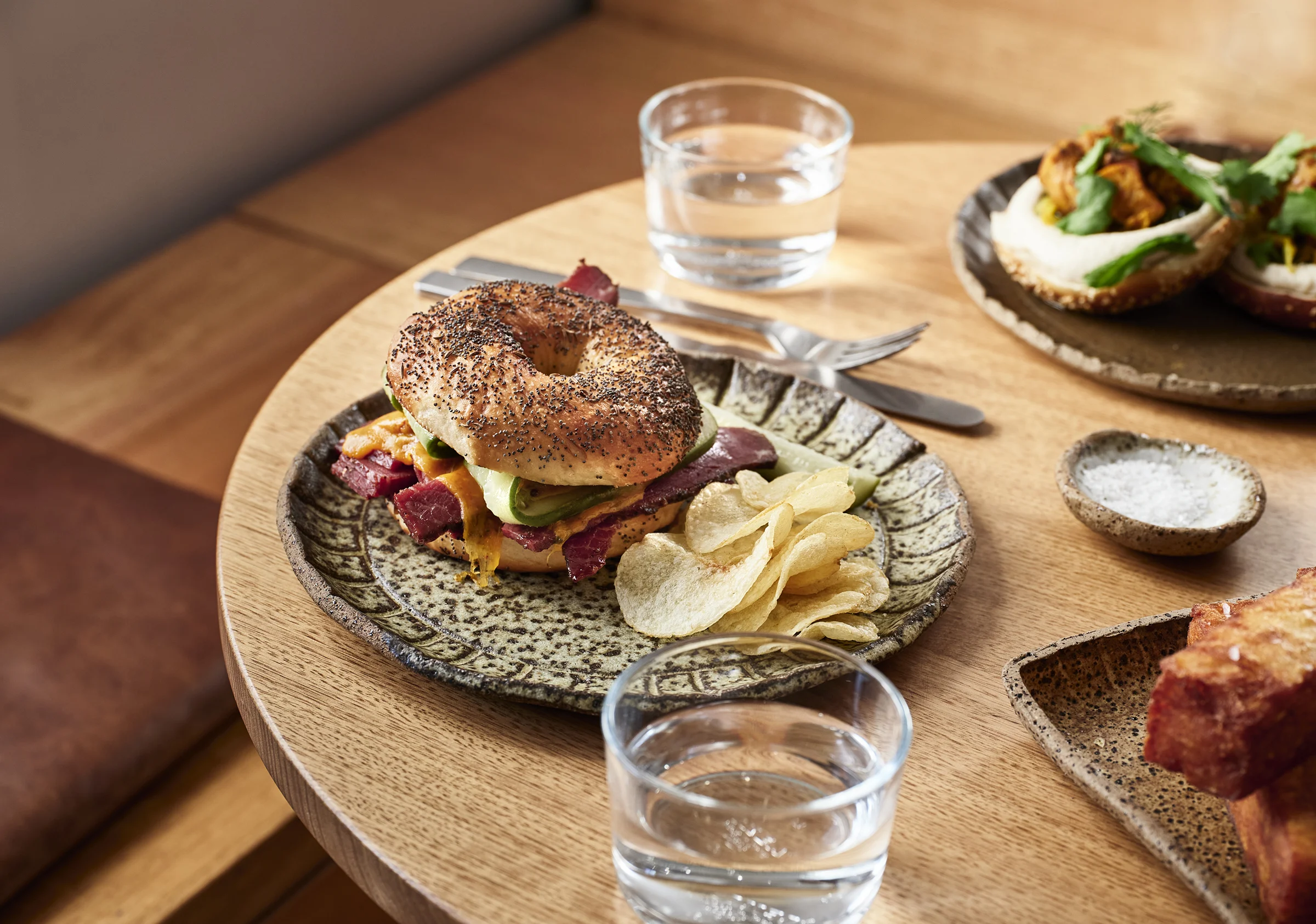
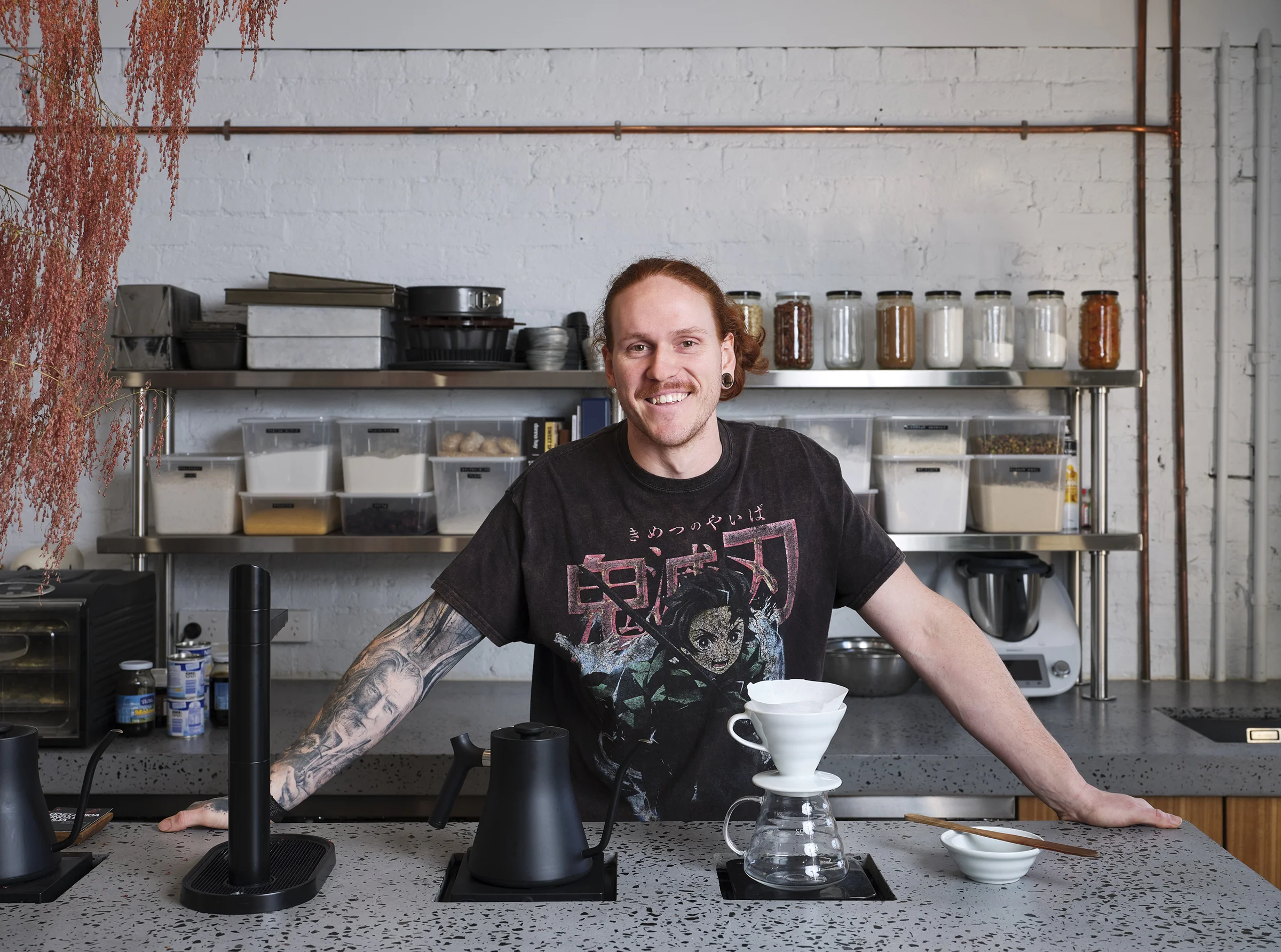
But running three venues alone is tough. Christopher is considering bringing on a business partner but isn’t sure how to go about it. Thankfully Joe Vargetto from Mister Bianco has seen a variety of partnership structures in his time and has some words of advice and warning.
Subscribe to Coolroom Confessional
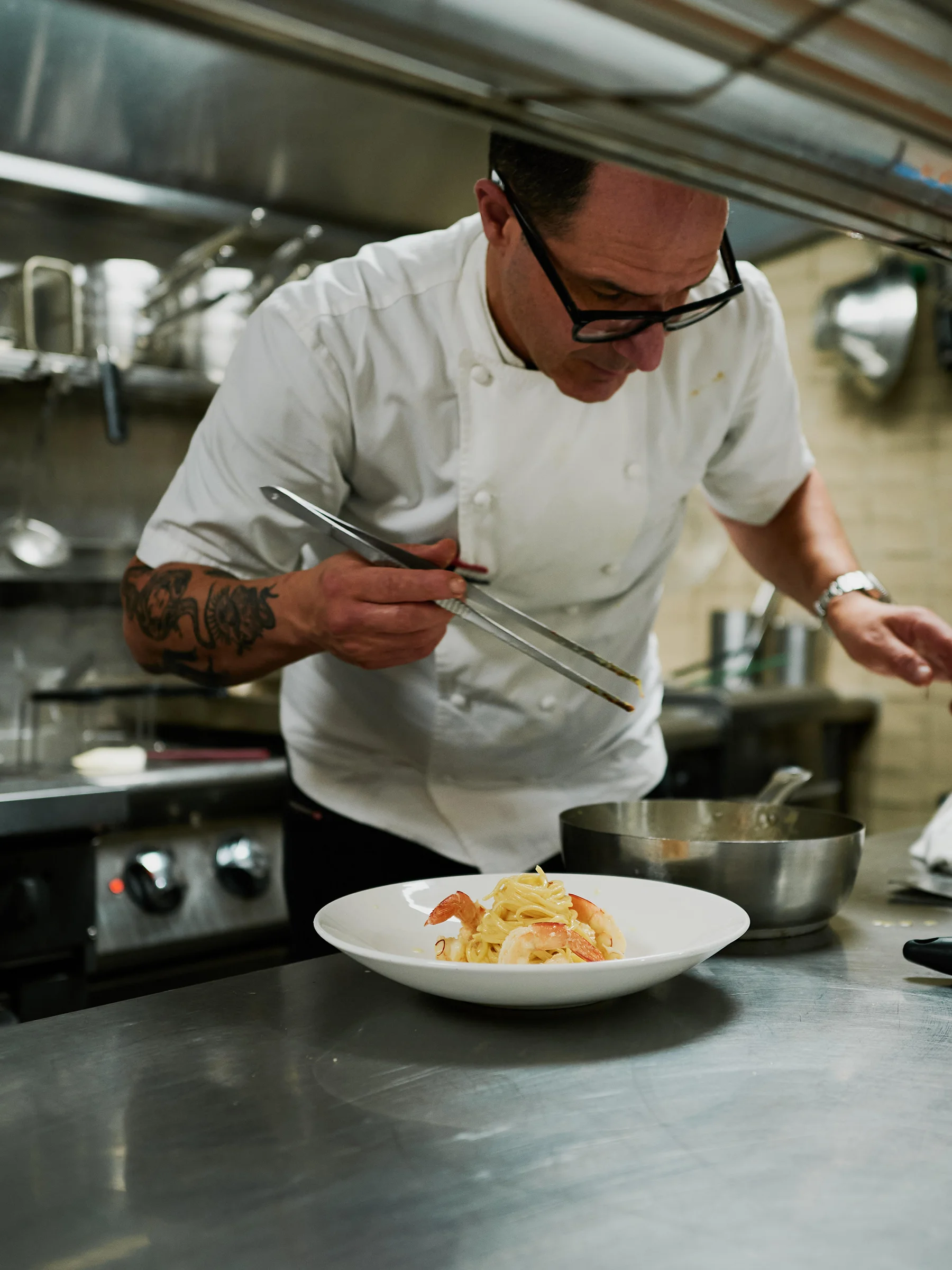
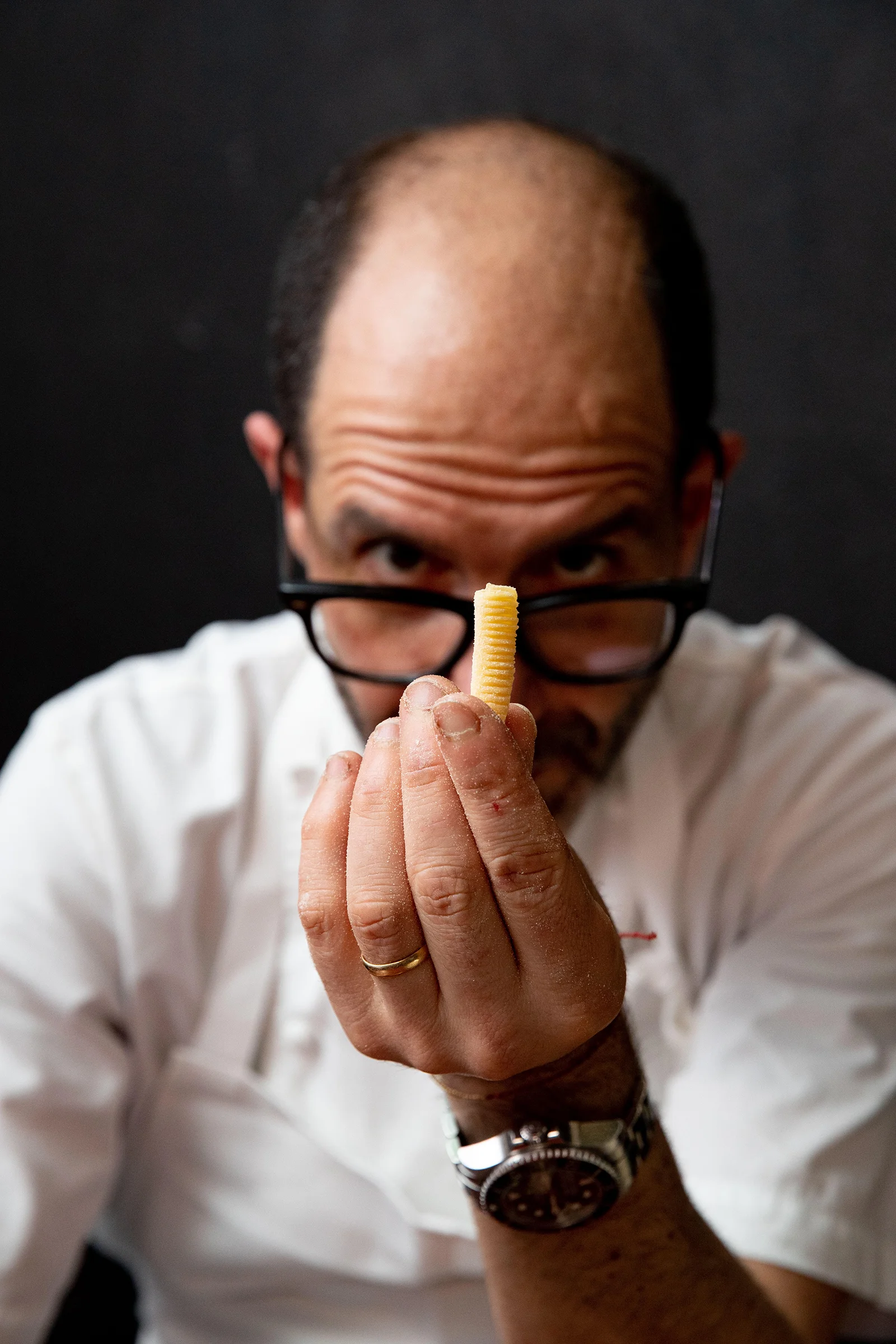
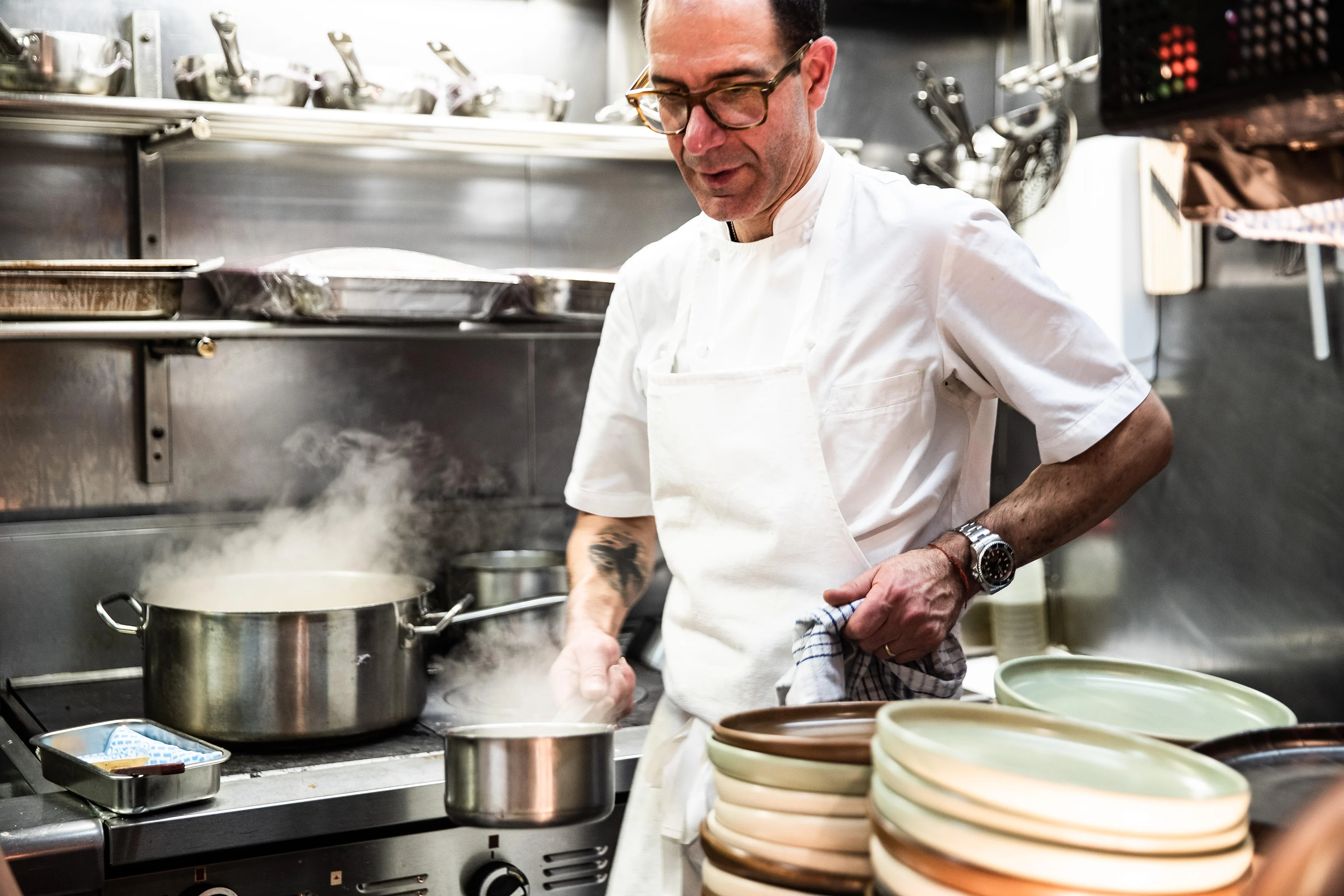
Episode Transcript
Melissa Leong:
We are proudly supported by American Express. Whether you’re baking bread at sunrise or serving drinks into the night, American Express has your back. As a Square seller, you pay one low rate to accept all major cards, including American Express. And you can order your complimentary signage to attract more customers directly to your door at amexpop.com/square.
Intro:
Yeah, I remember talking to the team that night, I cried. I cried in front of them.
What I would not do, and write this down, put it in highlight, don’t do it.
We made so many mistakes that we’re always going to make.
Don’t let Lorenzo measure the store.
A lot of them were terrified that the business would fail within six months. They said that in those words, they were like, “You will not survive six months.”
And you have to try it. You have to just roll the dice. I think you have to take those risks.
Melissa Leong:
This is Coolroom Confessional, a podcast by Square. In this series, we’re offering hospo business owners a place to confess their problems. With some expert help, we’re going to try and solve them. I’m Melissa Leong. I’ve been a writer, culinary critic, and TV judge. Today, I’m meeting Chris Norris. He’s the owner of Opus Coffee. His portfolio is about to triple, and he’s in the market for someone to share the load.
Let’s pretend you’re about to open your third hospitality venue. Your spare time is precious and limited, so how do you spend it? If you’re a Wollongong Cafe owner, Chris Norris, you walk out of your cafe and into another one.
Christopher Norris:
My downtime, literally, when I’m at Opus, I’ll be like, “Oh, thank God now, I can go to someone else’s cafe and just sit there, drink coffee, and eat food.”
Melissa Leong:
Caffeine addiction, undoubtedly. But this is also research, and it’s how Chris has gone from being a newcomer to the cafe scene, and within a short time period, opened three venues as a solo operator.
Christopher Norris:
Found out Opus was for sale, because I used to go there. It was like my cafe. Didn’t even know it was for sale. And everyone had had their pass at it. It was actually kind of pretty well-priced from what I understand businesses to be now. Straight up, no hospitality experience, and I go ahead and own that.
Melissa Leong:
Chris is a details dude. He likes things to look good and work even better.
Christopher Norris:
Right, ADHD, attention to detail, which is hard to let go.
Melissa Leong:
Opus’s success is down to strategy, gaming the venue, gaming the menu.
Christopher Norris:
20% of the menu is, probably 80% of the sales.
Melissa Leong:
And gaming the prices.
Christopher Norris:
I’m an oat and soy in pallet. We’ve nailed everything we can nail in terms of product and supply.
Melissa Leong:
But this is one game Chris would like to open to another player.
Christopher Norris:
I didn’t know what to expect. That’s one question I ask people in my situation, “As an owner of a business that has three businesses, what do I do, What is my day?
Melissa Leong:
But who, where, and how do you find a business partner if you have no willing friends or family lined up? Or, are there other ways of sharing the load? Chris Norris, Opus Coffee Brewers owner is with us now. Welcome, Chris.
Christopher Norris:
Hello.
Melissa Leong:
Can you describe your venue and what you do?
Christopher Norris:
So I’ve got a café, essentially like a classic Australian culture cafe. I want to say really good coffee. I’m sure everyone says really good coffee. Yeah, we’re always guesting in guest roasters every two weeks, just to mix it up to keep things interesting there. Most of the products are made in-house, bagels, roll that every morning. It’s actually a tragically small site for what we do, thus the expansion
Melissa Leong:
You’re actually shopping for people to take on this load with you, speaking of expansions. Where are you now in terms of your capacity to be running the venue that you have and the two venues that are in that rollout?
Christopher Norris:
In terms of Opus, where I used to be the manager there, because I found it really hard to be a full-time manager on site and then have any energy to fit out a new shop. So I’ve got someone in to do front of house, for the venue managing of Opus. And now, I’m just the official call in sick, call Chris guy. I work full time just project managing these other sites, trying to get them operational.
Melissa Leong:
Stepping out of the business so that you can work on the business, in effect.
Christopher Norris:
Pretty much.
Melissa Leong:
The goalposts keep moving.
Christopher Norris:
None of them are the same. There’s like Opus, its own thing, bagel shop, the second venue being Mid Bagels, which is just straight up a bagel shop and a little micro bakery, and the goal there was to supply Opus with better bagels, bigger oven, move from a combi oven to a deck oven. And then the third venue came around, whereas a local business came up for sale and it was a sandwich shop.
And we did the math, worked it out procedure-wise, delivery runs, and we’re like, “Yeah, this works.” Then we got snaked on the bid for that. And then we got really keen, so then we found another site that was available and we just added that to the repertoire, and we said, “Yeah, it’ll be fun and a learning experience opening to at once,” which it has been.
Melissa Leong:
Joe Vargetto is someone that I really wanted to speak with Chris, not only because of this conversation over multiple venues that all have a different personality and some differentiation. Joe, your venue is Mister Bianco, Massi Fondanta 1872. You’re very successful across lots of different venues. You love to have lots of fingers in different pies, but you also coach other businesses in the industry and you love to see them succeed.
Joseph Vargetto:
Absolutely, yeah. I was very fortunate to have a very varied career, in the sense of I did my formal apprenticeship. I went overseas and worked at Michelin-starred restaurants and got my head bashed in a few times. You know what I mean?
Melissa Leong:
You’ve learned the ropes the hard way. Now tell us a bit about your venues. You’ve played with a couple of different ownership models over your time in business ownership, starting off with partnership.
Joseph Vargetto:
My first place in 2006 was with a partner that went really, really well. But what, I think what I found out very early is that when you take on a partner, you don’t just take on a partner, you take on everything behind them.
Melissa Leong:
Yep, their family, their lives.
Joseph Vargetto:
Their family, their habits, everything. Your partner might come up with financials to be your partner, but then you take on their lifestyle. And I always say to myself, it’s never about the money, it’s about the partnership and the relationship-
Melissa Leong:
Yeah.
Joseph Vargetto:
… because if you can get that right, everything will blossom.
Melissa Leong:
Yeah, it’s really about the fit beyond just whether or not you have the money to come to the party-
Joseph Vargetto:
Correct.
Melissa Leong:
… to support the business.
Joseph Vargetto:
What other things are you offering as well? So is it advice, is it marketing strategies, is it how to coach staff? So there’s a lot a partner can bring, but also there’s a lot a partner can dissolve as well.
Melissa Leong:
Now, Chris is looking at that big step of taking on, potentially, partners to share in with the work. What advice can you give him in terms of the benefits of sharing a business with partners?
Joseph Vargetto:
Chris, if it’s your idea and your vision, you need to really implement what that idea and vision is and take the partnership, I think, slowly. Maybe have a grace period of, I don’t know, 90 days or six months, but also look at the exit clause as well. So how does it look when everything is really beautiful and how does it look when everything is really bad? And I’ve seen partnerships dissolve over when it’s really successful, because one wants this much money, one wants this much time off, and they don’t see eye to eye. And then sometimes, you see partnerships dissolve when one has something in their lives that is not good.
Melissa Leong:
When things aren’t quite aligned.
Joseph Vargetto:
Correct.
Melissa Leong:
Mm-hmm.
Joseph Vargetto:
Firstly, I think introduce it as it’s your vision. You want to celebrate the fact that you want a partner, but what does a partner look like? I think if you just take on anyone off the street and hope for the best, hope sometimes doesn’t help, you know?
Melissa Leong:
Chris, do you have any questions about how to go about choosing a partner or where to find one?
Christopher Norris:
Yeah, definitely. Three is scary. But, I mean, the plan is more after three, so thinking ahead, I want someone to fit that role. How do you find that person in the sense of are they in your organization already? How do they buy in to a venue where, in my instance, I am funding the fit-outs. Essentially the outlay of everything is funded by me, so then I need talent. I need to know someone’s going to be there.
I’ll go to sleep, not wondering if I’m going to get a call. Is it like, yeah, let’s get you on salary, no ownership with the long-term plan being, there’s some buy-in. Don’t know what that looks like in the sense of is there an outlay for a partner, agreed-upon percentage of business worth for agreed-upon ownership? Those are the questions I’m trying to get my head around.
Joseph Vargetto:
Yep. I think the question for yourself is what do you want to get out of it? Number one, two have to pay for three and four. If you go back to a little concept plan for yourself and ask those questions, then release those things to someone possibly that’s working in your business that you find trustworthy. Usually, a lot of people in hospitality don’t have a lot of money, so if you’re asking for some sort of outlay of finance, usually they don’t have it, so then you put them on some sort of, maybe three-year ownership plan.
Christopher Norris:
Yeah. The idea that when someone’s in, they’re in is something I know I’ve got to get around, in terms of figuring out a contract. I don’t want no contract. You come in, you buy in, and then you’re like, “Okay, great. Now I don’t have to work in the venue.”
Joseph Vargetto:
What are these strict parameters to keep them online after three years? Because what I’ve seen as well is that once you talk about ownership and they sign the contract of ownership, most times, they go the other way. Because, “Oh, now I’m the owner. I can do what I like.”
Christopher Norris:
I think my biggest thing is how do you pick them? Yeah, I feel like you have to work with them. You can’t just be like, oh, I’m advertising for a business partner on Seek. I’m taking applications, doing interviews.
Melissa Leong:
There’s no Hinge for partnerships.
Christopher Norris:
Yeah, totally. There’s a model.
Melissa Leong:
There’s a concept there.
Joseph Vargetto:
I think a business partner is very much like a marriage or a long-term relationship. Having dates with your business partner for a period of time. Maybe you have something like six months. A lot of people can put on makeup really well and they come in for the first couple of weeks, “Yeah, I’m going to do this-“
Melissa Leong:
Put your best foot forward.
Joseph Vargetto:
“… yeah, I’m going to do that.” And then the makeup starts to come off and you see possibly the joker behind all of that stuff, and they just wear down, because their intention or their intent is not from the heart.
Melissa Leong:
When you’re finding a business partner, you could take lessons from other businesses that are on their way up, like Fricken’ Chicken. The business’s four partners have different strengths. They don’t all come from a hospitality background. Mo Saad says that’s what makes Fricken’ Chicken fly.
Mo Saad:
Went to uni, did corporate IT, so I bring that to the table. The team, or the founders are multidisciplinary, so not only just the food aspect, they also have the customer service. And then your branding in terms of your product, your packaging, the socials, online presence.
Christopher Norris:
I had no hospo experience. I suddenly have a cafe and I’m moving from back of house to front of house, and I’ve straight up got no idea. But I feel like having been through it with the interest and the drive for service and experience, if you find that person, I feel like they don’t have to run six hospitality venues.
Melissa Leong:
Yeah.
Christopher Norris:
Anyone with Macca’s experience, man, that’s gold. We love that. Yeah.
Melissa Leong:
We know Chris likes to go to other cafes for inspiration. And in the case of Opus, he even bought his favorite hangout. But maybe he can use his hobby to find a business partner too, especially if he likes how they make a latte.
Christopher Norris:
How would this go? They do great coffee. How do you even be like, “Hey, you should open a shop and we should partner up.” Yeah, it’s just a, that’s a wild thought, because I had that thought. I feel like it’s all just about you say you want to start that conversation in terms of a conversation, not the conversation of “Do you want to open a shop?” It might just be about figuring out this person and figuring out what they are doing and why they’re doing it.
Melissa Leong:
You’re already in a venue where you can ask them out for a coffee.
Christopher Norris:
Yeah, true. “Hey, do you want to…”
Melissa Leong:
Yeah, just want to…
Christopher Norris:
Table two.
Melissa Leong:
Yeah.
Christopher Norris:
Let’s do it.
Melissa Leong:
Just you and me, let’s have a chat. And I mean, I think sometimes just having open conversations with people and just genuinely connecting with people is a way that you can get a gauge for their energy, get a gauge for what they’re interested in, what they might be interested in, in the future. I think one thing that really strikes me about you is you have such an entrepreneurial spirit. You can identify the gaps, you can see where there’s an opportunity for something. Sometimes, all it takes is guts to be the plucky person that steps up and says, “Hey, how about it?”
Christopher Norris:
Yeah, true.
Melissa Leong:
So if that’s a strength of yours, then I say go for it. While we’re talking about business partnerships like relationships, Hannah Green from Etta Dining has a tip she wished she’d known, have the hard conversation before things get toxic.
Hannah Green:
Get a couples counselor or somebody before, when it’s all honeymoon and la la, and you’re passionate and this is what you’re doing and it’s great. You need to have systems in place when you come up against things. Because if you can’t have an open dialogue with the person that you’re going into business with, I personally don’t feel it will work.
Joseph Vargetto:
There’s a lot, and I think doing this now for about 18-odd years by myself and also with a partner, there’s a lot of pitfalls, but there’s also a lot of celebration as well.
Melissa Leong:
So we’ve talked about partnerships, but with two new venues coming online, Chris and Joe, we have a lot more to discuss.
This podcast is thanks to Square. Hospitality has enough on their plate. Square builds business tools that help hospo businesses like yours run smoothly. It’s more than just payments. From table layouts to a digital ticket system for your kitchen, it’s all integrated and it all talks to each other, because service still matters. Find out more at square.com/my/service.
Joe, when businesses are going well, of course there’s a lot to celebrate and you do learn. But arguably, failure is where we all, as human beings, learn the most when it comes to partnerships and business ownership. When things don’t go so well, when do you call it?
Joseph Vargetto:
Good question. It’s a bit like a bad boyfriend or bad girlfriend. “I’m going to try to help him. I’m going to try to be… I’m going to turn them around.” Often, the case they’re not going to. So I always say just cut it early. It’s the best way to do it. Whether you can re-buy them out or you just pull the pin. Because, often the case, you’re throwing good money for bad, and in six months, three months, three weeks, you could be financially broken.
Melissa Leong:
This is an issue that’s so universal, it has a name, the sunken cost fallacy. When you’ve invested so much energy, time or money, that it feels wrong to throw it all away. Whether it’s a personal relationship, a partnership, or a whole business, there’s sometimes a point where you have to face facts. The tricky thing is, it’s not always easy to tell when you’re digging yourself into a hole you can’t get out of. Is it as simple as that, that it’s a gut instinct? This is clearly not going to work, therefore it’s not going to work no matter how much effort you put in? So cut it early is the best advice you can get give.
Joseph Vargetto:
I think so. Either you dismantle the business or you take the business away. And I think that you always need to have some sort of clause, an out clause, an exit clause in it.
Melissa Leong:
Chris, with one venue live and two on the cards, that means staff and training. You obviously want to retain staff once you’ve invested in that hard-earned training. Do you have any plans on that front, and do you have any questions for Joe in terms of staff retention?
Christopher Norris:
True. It is a bit daunting, like opening two at once. I do plan on promoting up some key people. Weirdly enough, Opus has never had an issue getting talent, so I’m weirdly going into this thinking it won’t be a problem, in my delusion.
Melissa Leong:
How far is the delulu going to take you?
Christopher Norris:
Yeah, yeah. I don’t know. They’re cool venues. I’m a foodie. I love fit-outs. I walk into a venue and I just froth a fit out. That’s number one for me. I feel like once we start putting up photos of what the venue’s going to look like, it’s going to be appealing to that younger age group that want to be in that scene. In terms of holding onto talent, I don’t know the idea that here is what I want for the venue, but I’m also not going to say, “Here is your menu. Go make it.” Creative freedom’s pretty important for me to pass that on. I think I’m going to be all right. Ask me again in 10 weeks we open the sandwich shop.
Melissa Leong:
Joe, any advice?
Joseph Vargetto:
One statement you just said, “I think we’re going to be all right,” worries me.
Christopher Norris:
Yeah.
Joseph Vargetto:
But you have to bring a concept as close to reality without obviously opening the doors, on paper, as close as possible. Your accounts or your budgets or your concepts, daily takings, how does that all look? Giving a lot of your key people creative freedom sometimes is the death knell. I think creative freedom to people that have shown their worth is not a problem, or someone that’s come across from another venue that has been there, I don’t know, maybe four or five years, that has a proven track record. What you believe in trust is, like you’re a hundred percent. Someone’s trust is very wishy-washy, like after a couple of weeks they go, “Oh, I’m going to be in at 4:00.” It doesn’t work sometimes. It just doesn’t work.
Melissa Leong:
Sounds like there’s some hard and fast lines that you really need to lay down, and then knowing where to color outside the lines is something that you both have to agree on, both you as the primary owner and then your partner’s as well. Chris, bagels are your jam, that’s what you do. Are you looking for any improvements or efficiencies with more venues when it comes to bagels as a product that you’re producing?
Christopher Norris:
We’ve hit a capacity for what we can actually roll in our kitchen. We have that issue where we constantly run out of bagels. It’s good and bad thing. I mean, I like running out. I don’t like running out when it’s 11:00. The big reason for a new venue is let’s get a cool room, let’s move to overnight proofs. Quality of product I’m pretty excited about. So moving from just a standard combi oven to a baker’s deck oven, higher temperatures.
Quantity? We’re going to be able to supply two venues worth of a better-quality product, using one site to make a chain. Why I feel like I can’t get a product that’s our quality or better. All I can do is pay more for a lesser product. So the idea that we can make our product even cheaper, it’s just exciting there.
Melissa Leong:
The price matrix is something that everyone’s grappling with at the moment, and you’ve been talking about being clever with your pricing options. What does that look like for you?
Christopher Norris:
So our last menu, we decided just to consolidate on some of the bigger-priced items, bring them down a little bit, see how that goes. Making the products less expensive just means overall less gross, but wasn’t the case in the end. So that seemed to work and we kept that on our latest menu as well, just a bit more conscious on the environment at the moment. It’s not post-COVID times anymore where people are just excited.
Melissa Leong:
Just happy to be here?
Christopher Norris:
Yeah. So it’s worked out and it’s still in the model for at least the next menu. We’re going to assess thereafter. We’re not just being like, “Oh, we’ll take a dollar off this, $2 off that and hopefully it’s all good.”
Melissa Leong:
You know why you’re doing it.
Christopher Norris:
Yeah.
Melissa Leong:
Yeah.
Christopher Norris:
I feel like it’s working. We knew what we were doing and we knew what we wanted it to do, and I feel like that’s worked.
Melissa Leong:
Joe, this is a pretty crucial time for Chris, with two venues burgeoning as we speak. Do you have any questions for Chris that he should be thinking about in this pretty unique window of time before these two venues come to life?
Joseph Vargetto:
Yeah, for sure. Staff come to you for help. Do you have anyone that you go for help?
Christopher Norris:
Yeah, I’ve got a soundboarding person and then I’ve got an actual advice person. My soundboard’s my mum, so I usually just talk with mum and realize she doesn’t have anything too helpful to say, and I come to the conclusions myself. But I do use a coaching team, like an industry specific coaching group.
Joseph Vargetto:
Mm-hmm.
Christopher Norris:
They would be my official, “I’ve actually got this really specific issue, can I have some advice?”
Melissa Leong:
Getting targeted advice is crucial when you’re bringing a business to the next level or just trying to clear a hurdle that’s stopping you from reaching your goals. As Chris has identified, sometimes you need to go beyond family and friends to get honest feedback.
If you don’t remember, Chris has three businesses, Opus Coffee and another two that are about to open their doors, a bakery that also supplies bagels to the other stores and a European-style sandwich shop that will also open in the evenings for dinner.
Christopher Norris:
Didn’t really plan on having the sando shop as a dinner venue, or it making its own product. That was going to come from our micro bakery. But we had the idea we’re in a really densely populated residential area, and there’s just nothing out that way. So we’re like, “Let’s go there for a sandwich shop. It’ll be great. Out of town, parking’s great, whatever.” But then nighttime’s, it’s like, well, there’s even less. So we’re like, “Oh, let’s put a deck oven in the sandwich shop and we’ll do pizzas at night.” So the idea that it’s changed from a day venue, trading seven days a week, it’s a little 70 square meter site. And now, it’s a day venue, seven days plus four nights.
Joseph Vargetto:
Can I ask one question?
Christopher Norris:
Definitely.
Joseph Vargetto:
Why do you want to do seven days? Is seven days optimal or would you want to have a look at your trading hours? I used to do seven days, six days, and so on. And now, what I’ve found is that you take a day off or you even take two days off, we’re closed Sundays and Mondays, and sometimes you do the same revenues in five days. Maybe taking a trading day away and giving everyone a day off. Sometimes that can cull your payroll by maybe 10%, giving everyone a day off together.
Christopher Norris:
Yeah.
Joseph Vargetto:
If you give them too much, they don’t want it.
Christopher Norris:
I like consolidating.
Joseph Vargetto:
Maybe opening a day where it’s more of a delicatessen, or maybe at nights is a delicatessen or a quasi supermarket where you can… Is your coffee close to a window where you can do takeaway coffees and things like that as people walk past?
Christopher Norris:
Yeah.
Joseph Vargetto:
Because what I’m trying to work out is, does everything have to be in-house? Because there’s a lot of technologies, and Square is really, really good at what they do. And a lot of these things that they can do is interact with your website. For example, I want to pick up lunch at 1:00, tuk, tuk, tuk. 1:00, you put in a beautiful bag and off they go. And having guests in-house is sometimes more costly than if they just pick up a brown paper bag and off they go. Maybe at nights you don’t open, and what you do is you create meal packages or dinner packages where people think, “Well, Jesus Christ, I can get a roast chicken, focaccia, some lovely potato salad,” and you’re open between 6:00 and 7:30 just for-
Melissa Leong:
Trattor-style-
Joseph Vargetto:
Yeah.
Melissa Leong:
… take-home meal.
Joseph Vargetto:
Which they do in Italy, it’s called a rosticceria, and they open up till about 8:00 and they got beautiful potatoes and roast chickens and all the rest. It’s beautiful food-
Melissa Leong:
That sounds so much more elegant than a bachelor’s handbag.
Joseph Vargetto:
Yeah.
Melissa Leong:
Joe, lots of really sound advice there about different things that Chris can think about. Chris, you’ve already experienced such success with Opus. Looking back at what you’ve achieved so far with your trajectory, are there any things that you would’ve done differently?
Christopher Norris:
Something I’m putting into practice right now was the fit-out. So I took over Opus from an existing owner and did that thing where I walk into a venue. And what would I do different? Had what I wanted to do to the site, pretty much could to go, but just the advice I got at the time was like, “Oh, be a little bit conservative on the fit-out.” And I’ve always regretted not doing a few things, and it actually costs me later on, in terms of a shutdown and then more expense to implement somewhat of that original plan. So now, I’m taking that into these venues and thinking, I found myself just re-going over the plan, taking everything apart, probably the fifth time.
Melissa Leong:
Measure five times, cut once.
Christopher Norris:
That’s probably been my biggest takeaway in the last three and a half years. I’ll be honest, I feel like it’s been a great three years. So if that’s my biggest lesson learned, I think that’s, I can acknowledge that’s a good thing.
Joseph Vargetto:
Yep. If I can say one thing, you’re going to look into an oven and you know you’re going to grow, and let’s say you’re buying an oven with a four tray compared to an eight tray or a stovetop and so on. Always look to buy the bigger one. Because then you can grow into it without having to pull things apart and waste time.
Christopher Norris:
Yeah, definitely.
Joseph Vargetto:
But manage your time as well. And consistency, on a Monday, that’s what you do, Tuesday, that’s what you do, Wednesday, there’s always… maybe your team management meeting. So they, everyone that works under you or for you, let’s say, they always understand you’re going to have these questions for them.
Christopher Norris:
My organization software, I’ve got my week, Monday, Tuesday, all of it, I’m like, “What do I actually do anymore?”
Melissa Leong:
Like just about every founder who goes from one to multiple venues, he’s wondering how and where his time is best spent. Luke Whearty, co-founder and co-owner of Byrdi Bar, in Melbourne, has given himself a role.
Luke Whearty:
I had a huge realization when my son was born that I had to weigh up, okay, what is valuable time and what’s time that’s wasted? And I came up with taking out the bins at 3:00 in the morning, being here till absolute close and locking up, that’s not a good use of my time.
Christopher Norris:
I can’t run any one shop as well, so I feel like it’s just about literally just driving to each venue every day. But I feel like now I’m getting into a stage where I’m people managing.
Melissa Leong:
I think you’ve definitely hit the nail on the head there. I think clarifying your function, realizing that at this stage in owning multiple businesses, it is about people, it is about motivation.
Joseph Vargetto:
Yeah. What I’m facing at the moment is that people are now wanting you to work out the issues. So give it back to them. How would we change all this? What’s the customer feedback? Always give it back to them to be part of the solution. What you do, do it really, really well. Be consistent and just protect your golden goose.
Melissa Leong:
Chris, any takeaways from today?
Christopher Norris:
I think my biggest takeaway is do what you do really well. Something you said there. It’s really hard to not just do the whole thing at once in terms of going back to foundations. It hit pretty well. I mean, for us, we just lost two of our bakers and they were really good too. One just changed cities and the other just has a hand injury. So our products, doing what we do well is the bagels, so keeping an eye on that in terms of training and making. If we lose another baker, we’d be in a bit of a pickle. So yeah, something to think about there, that’s my takeaway.
Melissa Leong:
Some very sound advice from you. Thank you so much for being here, Joe?
Joseph Vargetto:
It’s a pleasure. It’s been great.
Melissa Leong:
So, what have we learned, and how can Chris use these lessons as he opens his second and third venues?
Christopher Norris:
I do know we can go further together, so I think I am going to be pushing on for a fourth, with a partner to take some of that stress off. Because, ultimately, I’m responsible for everything.
Melissa Leong:
The first lesson, approach business partnership a bit like a relationship. Go on dates and find out what makes the other person tick. Sign on the dotted line with clearly defined roles and plan your exit. The next lesson, quality is king when it comes to product. In Chris’s case, bagels are the hero of his business and he has to protect their quality. And an important one, be data-driven. Stay across insights on your costs of goods in each item of your menu and sales figures, like Chris does with Square.
And coming up next on Coolroom Confessional…
Martin Rehak:
And you will go and you will see a Belgian Dining, Belgian restaurant. I would say the majority of the people who go, “Oh, I don’t know what it is…”
Joel Valvasori:
Dedicating so much menu space to desserts is probably not the best use of your time.
Melissa Leong:
This podcast is thanks to Square. Hospitality has enough on their plate, Square builds business tools that help hospo businesses like yours run smoothly. It’s more than just payments, from table layouts to a digital ticketing system for your kitchen. It’s all integrated and it all talks to each other, because service still matters. Find out more at square.com/my/coolroom.
We are proudly supported by American Express. Did you know that Square sellers automatically accept American Express with the same low rate as all other cards. Let American Express card members know that you support their payment method of choice with Square. Get your complimentary signage and supplies at amexpop.com/square to help you attract more customers.
![]()




